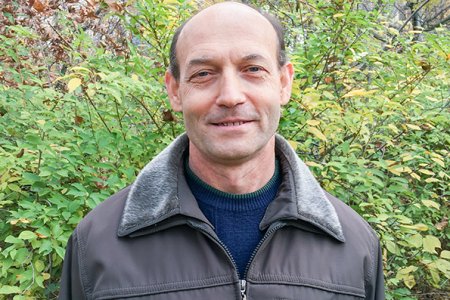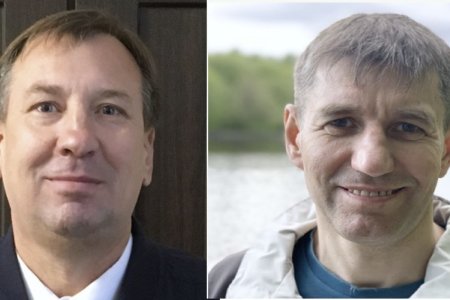
Armed and masked enforcement officers have carried out a new attack on Jehovah’s Witnesses in occupied Crimea, with five searches and interrogations on 5 August and criminal charges laid against 68-year-old Tamara Bratseva from Rozdolne.
The Jehovah’s Witnesses report that several armed groups of enforcement officers in masks burst into the homes of six believers in the city of Alushta and two urban settlements – Rozdolne and Sinokisne – in the early morning of 5 August. They appear to have been rough in their behaviour, and in one home threatened to hurt the family’s pet. They seized all electronic devices, demanding to know passwords to them, and also tried to grill the Jehovah’s Witnesses about fellow believers.
In Rozdolne, armed officers also turned up at one person’s work, forcing him, facedown, to the floor and binding his hands with a cable tie so tightly that he was later forced to turn to an injury unit. The latter confirmed the damage caused, but the medical record was then taken from him at the police station.
The proceedings were under the control of Investigative Committee ‘senior investigator’ Y.A. Merkulov. It is he who will have brought the charges against Tamara Bratseva under Article 282.2 § 1 of Russia’s criminal code, with these formally laid after the searches lasting four hours. The charge, of ‘organizing the activities of an extremist organization’ has been used in occupied Crimea to sentence several Ukrainian believers to sentences of up to six and a half years’ imprisonment. Thus far the only other woman in occupied Crimea to have faced such persecution, Daria Kuzio, received a suspended sentence. At present, it is known only that Tamara Bratseva (b. 28.09.1955) has been forced to sign an undertaking not to leave the area, but is not under any form of house arrest or detention.
Thirty Crimean believers have so far faced criminal prosecution in occupied Crimea since Russia’s supreme court issued its shocking ruling on 20 April 2017, declaring the world faith ‘an extremist organization’.
Russia had begun administrative prosecutions and harassment of Jehovah’s Witnesses soon after its invasion and annexation of Crimea but began using criminal charges in late 2018.
The first arrest was of Serhiy Filatov (b. 1972) after armed raids in Dzhankoi during the night from 15-16 November 2018. He too was accused of ‘organizing the activities of an extremist organization’ under Article 282.2 § 1 with the ‘prosecutor claiming that the Jehovah’s Witness had “undermined the foundations of the constitutional order and the security of the state”, by, purportedly, being the leader of a religious organization. On 5 March 2020, he was sentenced by ‘judge’ Maria Yermakova from the occupation ‘Dzhankoi district court’ to six years’ imprisonment in a medium security prison colony, with this upheld by Edward Belousov from the ‘Crimean high court’ on 26 May 2020.
Artem Gerasimov (b. 1985) from Yalta was arrested during a second wave of armed raids on 20 March 2019. He too is serving a six-year sentence, imposed at appeal level after the first instance ‘court’, also on 5 March 2020, imposed ‘only’ a massive fine. It is possible that Moscow was still watching international reaction to such shocking religious persecution on occupied Ukrainian territory and preferred not to have two long sentences passed on one day.
Viktor Stashevsky (b. 1966) was sentenced by ‘judge’ Pavel Krylo from the occupation ‘Gagarin district court’ on 23 March 2021 to six and a half years’ imprisonment on the same ‘organizing extremist activities’ (Article 282.2 § 1 ) charge, and taken into custody in the courtroom. The sentence was upheld on 10 August 2021 by ‘judge’ Vladimir Avkhimov from the ‘Sevastopol municipal court’.
In a very worrying move, Stashevsky recently became the first Jehovah’s Witness from Russia or occupied Ukraine to have his sentence escalated, with a ‘court’ in Russia sending him to a prison, the worst of Russia’s penal institutions for part of the sentence.
Igor Schmidt (b. 1972) was sentenced by ‘judge’ Liudmyla Tumaikina from the same ‘Gagarin district court’ to six years, with this upheld on 17 January 2022.
Artem Shabliy (b. 1990) was initially arrested on 26 May 2020 after armed men burst into his home and caused injuries to one of his two small children by quite unnecessarily breaking a window during the raid. He was, at least, charged with ‘participation in an extremist organization’ (under Article 282.2 § 2) and was, on 16 February 2022, given a two-year suspended sentence by ‘judge’ Iryna Altanets from the ‘Kerch municipal court’.
Volodymr Maladyka (b. 1963), Volodymyr Sakada (b. 1970) and Yevhen Zhukov (b. 1969) were sentenced on 6 October 2022 by ‘judge’ Olga Berdnikova from the ‘Nakhimovsky district court’ in Sevastopol to six years’ imprisonment with this upheld by Gennadiy Vladimirovich Nikitin and two other ‘judges’ from the occupation ‘Sevastopol municipal court’ on 11 October 2023.
Oleksandr Dubovenko (b. 1973) and Oleksandr Lytvyniak (b. 1960) were sentenced on 1 December 2022 to six years’ imprisonment, with this demanded by demanded by prosecutor Minigul Saldykova and passed by ‘judge’ Tatiana Fedeneva from the ‘Armiansk municipal court’. The main ‘evidence’ against them was a Zoom conversation about the Bible, with this claimed to constitute ‘‘organizing the activities of an extremist organization’ (Article 282.2 § 1). Both men had been held under house arrest for over a year, and were taken into custody after the 6-year sentence,
There have been a few surprises, such as with respect to long sentences passed against Taras and Daria Kuzio, Serhiy Liulin and Petro Zhiltsov by ‘judge’ Vladimir Romanenko from the ‘Yalta municipal court’ on 27 February 2023. The sentences were overturned on 21 March 2024 by the ‘Crimean high court’, although this does not necessarily mean an end to persecution as the ‘case’ was sent back for retrial. The ‘court’ did, however, order the release from imprisonment of Taras Kuzio (b. 1978); Petro Zhiltsov (b. 1987) and Serhiy Liulin (b. 1984) with Daria Kuzio (b. 1982) having received a suspended sentence. Worth pointing out here, since Taras and Daria Kuzio have two small children, that a suspended sentence can become ‘real’ should a person be deemed to have ‘re-offended’. If believers are imprisoned for studying the Bible and religious worship, the occupation regime can decide at any moment that their continued faith constitutes ‘reoffending’.
Yury Herashchenko and Serhiy Parfenovych were also accused of ‘organizing the activities of an extremist organization’ but received suspended 6-year sentences from the occupation ‘Krasnohardiiske municipal court’ on 1 July 2024.
Maksym Zinchenko was found ‘guilty’ of participation in what Russia has called an ‘extremist organization’ for practising his faith. The sentence passed by ‘judge’ Valery Kuznetsov from the occupation ‘Nakhimovsky district court’ in Sevastopol was significantly lower than that demanded by the prosecutor and it is not clear whether it was challenged. On 17 April 2024, Kuznetsov sentenced Zinchenko to two years’ imprisonment, however he then applied a norm on making a sentence more lenient, and instead of imprisonment, ordered two years of compulsory labour, as well as restrictions on certain activities.
Other cases
Tadevos Manukian (b. 1981) was initially charged (with ‘organizing a so-called extremist organization’ under Article 282.2 § 1 together with Taras Kuzio and the others. His prosecution was, however, made into a separate ‘case’.
Viktor Kudinov (b. 1969) and Serhiy Zhyhalov (b. 1971)
The two men are also accused of ‘organizing a so-called extremist organization’ under Article 282.2 § 1 for holding services online.
Dmytro Naukhatsky (b. 1969) has been under house arrest since December 2022, when he was arrested after the FSB carried out mass armed raids of at least 16 homes of believers in Simferopol. He was initially charged with ‘organizing the activities of a so-called extremist organization’ (under Article 282.2 § 1), however on 24 March 2023, the same ‘investigator’, V.A. Novikov added a charge of ‘financing the activities of an extremist organization’ (Article 282.3 § 1).
Oleksandr Voronchykhin (b. 1963) appears to be facing ‘trial’ together with Yekaterina Demidova (b. 1956); Oleksandr Kotylets (b. 1977) and Dmytro Zakharevych (b. 1995). All three men are charged with the more serious ‘organizing the activities of a so-called extremist organization’ (under Article 282.2 § 1) while Demidova is accused of ‘participation’.
Oleksandr Kostenko from Sevastopol has been mentioned as facing charges since September 2020, It is possible that he had left occupied Crimea before the FSB’s repressive machine got to him.
Salekh Mamedov
Russia’s application of its legislation on occupied territory is in grave violation of international law. Its persecution of believers (and Jehovah’s Witnesses are not the only religious believers to have come under fire in occupied parts of Ukraine) violates not only international law and binding international conventions, but also Russia’s own constitution which, on paper, guarantees religious freedom.



